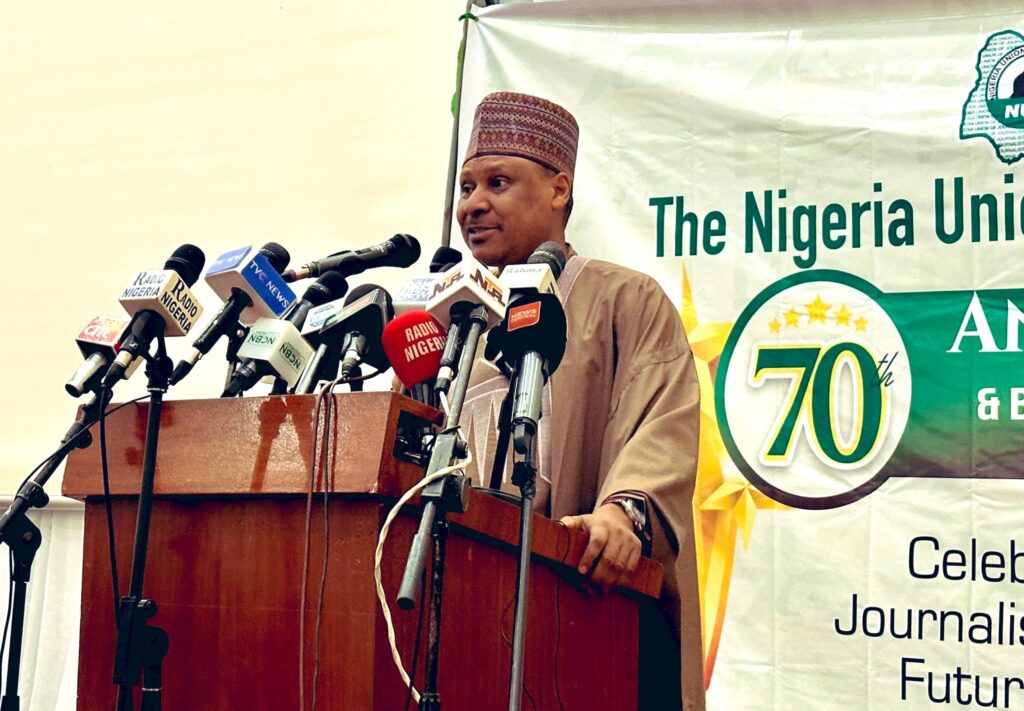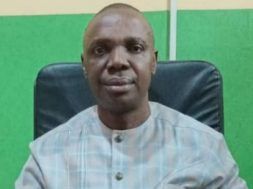Mohammed Idris, Nigeria’s Minister of Information and National Orientation, is raising fresh alarms over the disruptive impact of generative artificial intelligence (AI) on journalism, warning that deepfakes and disinformation are fast eroding public trust and complicating the role of journalists in upholding truth.
Speaking on Saturday during the 70th Anniversary Gala, Award Night and Book Presentation of the Nigerian Union of Journalists (NUJ) held at the Shehu Musa Yar’Adua Centre in Abuja, Idris says AI is reshaping the information ecosystem in ways that demand stronger ethical standards and renewed resilience from the media.
Idris, who represented President Bola Ahmed Tinubu as Special Guest of Honour at the milestone event, describes the advent of generative AI as a “double-edged sword”—enabling novel forms of digital expression while simultaneously amplifying the threat of misinformation on an unprecedented scale.

“The rise of generative AI in recent years has further complicated matters, bombarding us with a wave of deepfakes and sophisticated disinformation that makes credible journalism more challenging—and yet at the same time more urgent and essential than ever before,” the Minister says.
“The rise of generative AI in recent years has further complicated matters, bombarding us with a wave of deepfakes and sophisticated disinformation that makes credible journalism more challenging—and yet at the same time more urgent and essential than ever before,” the Minister says.
With journalists, media executives, and dignitaries gathered for the commemorative event, Idris calls for a recommitment to media ethics and evidence-based reporting. He underscores that AI-generated falsehoods are blurring the line between fact and fiction, leaving citizens vulnerable to manipulation.
“This deluge of falsehoods makes it harder for citizens to distinguish between reality and fabrication, and the consequences for our democracy, social cohesion, and public trust are profound,” he warns.
To tackle this threat, the Minister unveils a landmark partnership with UNESCO to establish what he describes as the world’s first Category-2 Institute for Media and Information Literacy (MIL) in Abuja. The proposed MIL Institute is expected to become a global standard-bearer for media ethics, digital literacy, and responsible journalism.
“This is why we are co-operating with UNESCO to establish, here in Abuja, a Category-2 Institute for Media and Information Literacy (MIL), the first of its kind in the world. When operational, this Institute will be a transformational resource that will serve and advance the cause of ethical journalism in Nigeria,” Idris says.
The Minister notes that while technology is redefining how news is created and consumed, it is also raising the stakes for journalists to act with greater integrity, skill, and vigilance.
He reaffirms the Tinubu administration’s pledge to uphold press freedom as a cornerstone of Nigeria’s democratic development. At the same time, he assures that the government remains committed to supporting journalists and media institutions through policies that enable them to thrive amid digital disruption.
“As I have said at many fora, and will say again today, the Tinubu administration will always be deeply committed to upholding press freedom… and we will continue to promote and advance policies and programmes that enable the media to thrive in the discharge of its responsibilities to our democracy and society.”
Idris also extends government support to the NUJ on key industry concerns, including journalist welfare, digital transformation, and gender inclusion, pledging collaborative efforts to reposition the Nigerian media for the realities of the 21st century.
“We are keen to work with you and support you to tackle these issues as you strive to reposition yourselves for the ever-changing landscape of the 21st century.”
While affirming the media’s responsibility to hold the government accountable, the Minister calls for greater synergy between state and press in the shared mission of preserving peace and democratic progress.
“Even as you hold us to account as government—and we very much welcome this—there is also room to see us as close partners, and active co-creators along with you of the peace, security, and prosperity that our great nation deserves.”
Idris rounds off his speech with a tribute to the NUJ’s seven decades of journalistic excellence, lauding industry pioneers like Chief Aremu Olusegun Osoba and Sam Amuka-Pemu, publisher of Vanguard Newspapers, as “exemplars of the very best the profession has to offer.”
Source of Article



